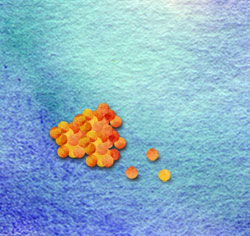>
“I hope you remain in good spirits,” wrote my friend in the last line of his e-mail. “Ha!” my monster-mind replied. “In order to remain in good spirits I have to be in good spirits in the first place. How long has it been since I’ve felt in good spirits?” Okay, monster, let’s dance.
The free dictionary defines in good spirits as “without losing equilibrium.” We use the expression when we are talking about getting over a health challenge or relationship difficulty.
But what are good spirits? I dodged the alcohol and ghost-related Google results, spent some time remembering my experience with positional vertigo during bedrest and finally connected “good spirits” with the best spirit: the Holy Spirit. Pentecost Sunday this year is May 23, 2010. Pentecost is one of my favorite Christian traditions. We tell the story of Jesus’ apostles gathered together following the execution of their leader. “Suddenly there was a noise from heaven like the sound of a mighty wind. It filled the house where they were meeting. Then they saw what looked like fiery tongues moving in all directions, and a tongue came and settled on each person there. The Holy Spirit took control of everyone, and they began speaking whatever languages the Spirit let them speak.” (Acts 2:1-4)
The Pentecost story is an answer to the question: how do you keep going when it looks like everything is lost?
The answer: the Holy Spirit, something mysterious enough that it sends us traipsing back to the Holy One to say, “hunh?” Now we are in conversation with—in relationship with—God, which is just where God wants us.
I grew up in church with stained glass windows that included a depiction of the Spirit descending like a dove. I am wrestling with the concept of hope this summer, at the invitation of my present church, which is studying the book Apprenticed to Hope. My initial (monsterish) response is that “I don’t do hope.” The author and my church companions are slowly opening me to the possibility. The dove is also used as a metaphor for hope, thanks to the story of Noah’s released dove returning with an olive branch in its mouth.
I decided to see what I could learn by playing with the metaphor of the dove.
How do I await the Holy Spirit? How do I invite hope?
How do I attract doves?
It turns out, according to the folks at the University of Georgia, to be fairly simple. Doves want food and water. They nest in piles of twigs (sometimes in low bushes, sometimes on the ground), but they’re willing to travel distances to get what they want. Even if my heart is not the perfect habitat for the Spirit, it’s willing to find me and able to put up with a less than perfect host..
Doves like to drink water, that common substance that covers 70% of the world’s surface. Yay! I’m common. I also am embarrassed to admit that I didn’t quite know what water does for a biological creature. It turns out that our bodies need water to regulate temperature, provide the means for nutrients to travel to our cells, remove waste, and protect our joints and organs.
I can translate those functions into a list of spiritual disciplines. A practice of meditation helps me regulate the extremes. Participating in community and worship allows nutrients to travel to where they are needed. Confession removes spiritual sludge. Practicing the presence of God (prayer) helps protect my functioning parts.
This is where the monster raises its ugly head to say, “Practices! You’re no good at practicing. You do great for three days and then you go back to your old nasty habits. That little bird is gonna die of dehydration in no time.” Sigh.
 Doves like to eat millet, a general term for small-seeded grasses grown in difficult production environments. Yay again! My soul is absolutely a “difficult production environment.” Rather than spending hours cooking sumptuous dinners for these little birds, I can find some tiny seeds to scatter that might attract them.
Doves like to eat millet, a general term for small-seeded grasses grown in difficult production environments. Yay again! My soul is absolutely a “difficult production environment.” Rather than spending hours cooking sumptuous dinners for these little birds, I can find some tiny seeds to scatter that might attract them.
If these practices seem like hard to crack, huge sunflower seeds, what would be millet?
Just for today I can:
- Pray the Lord’s prayer (worship, supplication, confession and practicing the presence in one convenient package)
- Have a quiet time of meditation—even if it’s only two minutes.
- Call a friend.
Later this week, I can go to church.
What would happen if I lived each day as an invitation to hope and the Holy Spirit?

